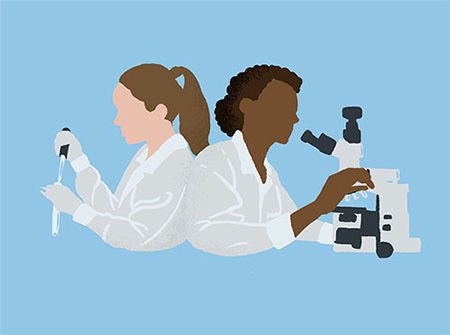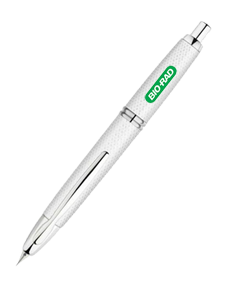
Popular topics

Voices of Women in Science: Dr Helen Wright

As part of International Day of Women and Girls in Science, Bio-Rad invites researchers to share their own experiences of being a woman in science. In this article, we speak to Dr Helen Wright about her career.
Helen Wright is a Senior Lecturer at the Institute of Life Course and Medical Sciences, University of Liverpool, UK. Her research focuses on the role of neutrophils in chronic inflammatory diseases, such as rheumatoid arthritis. She speaks candidly about her unconventional path to science and shows us that it’s never too late to follow your passions.

Dr Helen Wright. Image courtesy of Helen Wright.
Bio-Rad (BR): When did you first become interested in a career in science?
Helen Wright (HW): I loved science when I was at school, and I had a microscope when I was a child. My dad was a chemistry teacher, but I was always most interested in biology. I remember learning about Mendelian genetics for GCSE and immediately I was hooked. But I didn’t pursue a career in science when I left school, I actually took business studies and worked in admin roles for 11 years, before returning to college to take a foundation year to enable me to go to university to study molecular biology.
BR: Can you describe your career path?
HW: I worked in admin roles for many years after leaving school but was dissatisfied and really wanted to study biology. When I was 27, I spent a year at college doing a year 0 foundation course as I had no A-levels, and this enabled me to then study BSc Biochemistry with Molecular Biology at the University of Central Lancashire (UCLan). I graduated with a 1st class degree and actually won the Vice Chancellor’s Prize for student of the year which was a really proud moment as a mature student. It was only when I was doing my final year research project that I realized I loved lab research and that led me to pursue a PhD in immunology at the University of Liverpool. I was 35 when I completed my PhD, and this was followed first by a post-doctoral position and then subsequently by an Arthritis Research UK Foundation Fellowship then a Versus Arthritis Career Development Fellowship, which have allowed me to train in specialist skills and set up my own research lab.
BR: Have you encountered any challenges along the way and if so, how did you overcome them?
HW: The biggest challenge for me was keeping funding and employment between temporary contracts. I knew I wanted to set up my own lab as soon as possible so I needed fellowship funding, which is incredibly competitive, and in between funding I was employed on really short contracts (sometimes only for six weeks). That’s really hard when you have a family and a mortgage. I was really determined though. I knew this was what I wanted to do, and I believed that eventually I would be successful. Once I was awarded my second fellowship that opened the door to tenure-track positions and eventual confirmation in post in 2022 which was fantastic. But I was on temporary contracts for 13 years after my PhD, which was tough.
BR: Can you tell us about your current research?
HW: My research focuses on innate immune function in inflammation associated with autoimmune disease and aging. I work with fantastic collaborators and together we use a range of -omics technologies to complement our wet-lab experiments to understand how immune cells change when activated. We only use human immune cells, so I also have really good collaborations with local hospitals to get blood samples from people with different inflammatory diseases. I am really interested in the potential to develop small molecule inhibitors of immune cell activation to treat people with diseases like rheumatoid arthritis.
BR: What has been your career highlight to date?
HW: Aside from getting awarded my fellowships, I was honored to receive the Garrod Prize from the British Society of Rheumatology in 2017 which recognized my work as an early career scientist in the field of rheumatology. I was invited to give a plenary talk on my research at the annual conference in Birmingham which was by far the biggest audience I have ever spoken to.
BR: Are there any scientists who have inspired you?
HW: There isn’t one in particular, but I have had some really excellent support from mentors and colleagues in my department who I admire greatly both as researchers and teachers. One or more mentors can really make the difference in helping you get new experience, shape your CV, and tailor your job or fellowship applications.
BR: What advice would you give to women looking to pursue a career in science?
HW: Speak up! It’s really important that women get their voices heard. Speak up in class, talk to your tutors, ask about opportunities for work experience or summer studentships. If you are a PhD student, ask if you can help to organize a scientific meeting. Use every opportunity to get experience, go to a meeting, sit on a committee, take a class, everything that presents itself to you. You can learn so much from these experiences and more importantly, people get to know you. It’s your opportunity to shine. Finally, don’t give up. Careers in academia are tough, there is a lot of rejection. We are all sensitive to negative feedback, but you have to learn to brush yourself down and get back up again.
Thank you, Dr Helen Wright, for taking the time to share your career and advice with us. We hope your story helps to inspire and encourage the next generation of female scientists to follow their passions and use their voices.
Want to Hear from More Inspiring Women in Science?
Take a look at the other interviews in our Voices of Women in Science series to learn about the challenges women often face and the advice they give to overcome them.
You may also be interested in...
















